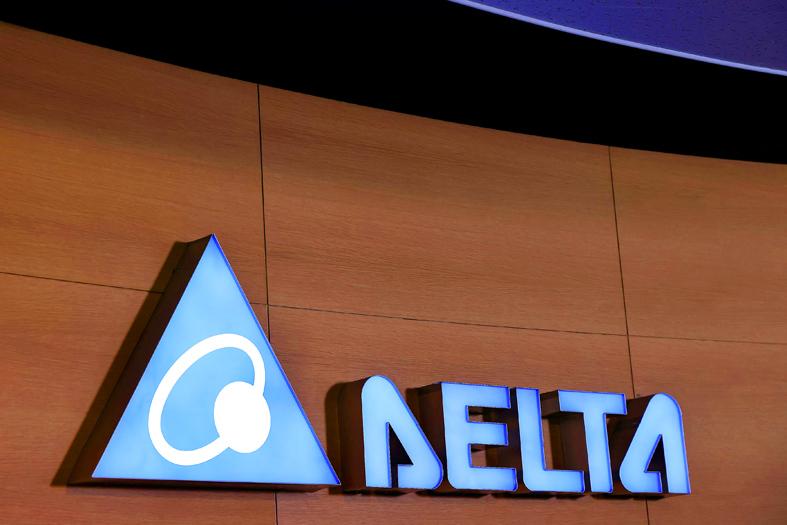Power and thermal management solutions provider Delta Electronics Inc (台達電) on Saturday said it would acquire US-based Universal Instruments Corp for US$88.9 million.
Taking over the precision automation solutions company would boost Delta’s smart manufacturing and industrial automation capabilities, and generate substantial research-and-development and customer base synergies, the Taipei-based firm said.
“Universal Instruments has a remarkable track record and long-lasting customer relationships in the electronics manufacturing field, which is a key focus of Delta’s industrial automation business,” Delta chief executive officer Cheng Ping (鄭平) said.

Photo: Ann Wang, Reuters
Headquartered in Conklin, New York, Universal designs and manufactures automation and assembly equipment solutions for electronics manufacturers. The company has customers in a wide range of sectors, including automotive, computing, medical, industrial and printed circuit board surface mount placement.
It holds more than 500 patents and has since its founding in 1919 delivered nearly 30,000 systems to customers, Delta said.
After the acquisition is completed, Universal would continue to operate under its original management team, Delta said, adding that the acquisition would be finalized when the conditions stated in the purchase agreement have been met.
“By adding Universal’s precision automation machine offerings and leading technologies to our highly diversified industrial automation portfolio, we can offer customers total solutions capable of enhancing the productivity” and reducing the carbon footprint of their production lines, Cheng said.
Delta’s automation segment contributed 14 percent to the company’s total revenue in the third quarter of this year, down 8 percent from the previous quarter, but up 16 percent from the third quarter of last year to NT$11.28 billion, the company reported on Oct. 29.
The power electronics and infrastructure segments are the biggest drivers of Delta’s business, contributing 60 percent and 26 percent respectively to its revenue, company data showed.
The deal with Universal comes after Delta in November last year completed the acquisition of Trihedra Engineering Ltd, a Canadian software company focusing on supervisory control and data acquisition, as well as industrial Internet of Things applications.
Delta invested C$45 million (US$34.9 million at the current exchange rate) in Trihedra to broaden its industrial automation and system integration portfolio, it said at the time.
Capital Investment Management Corp (群益投顧) said that Delta has over the past few years been looking for merger and acquisition opportunities worldwide, a strategy that would help it gain traction in the US and European markets.
Delta’s industrial automation business is likely to benefit from trends in the US and Europe in the long run, Capital said in a note.

South Korea’s equity benchmark yesterday crossed a new milestone just a month after surpassing the once-unthinkable 5,000 mark as surging global memory demand powers the country’s biggest chipmakers. The KOSPI advanced as much as 2.6 percent to a record 6,123, with Samsung Electronics Co and SK Hynix Inc each gaining more than 2 percent. With the benchmark now up 45 percent this year, South Korea’s stock market capitalization has also moved past France’s, following last month’s overtaking of Germany’s. Long overlooked by foreign funds, despite being undervalued, South Korean stocks have now emerged as clear winners in the global market. The so-called “artificial intelligence

‘SEISMIC SHIFT’: The researcher forecast there would be about 1.1 billion mobile shipments this year, down from 1.26 billion the prior year and erasing years of gains The global smartphone market is expected to contract 12.9 percent this year due to the unprecedented memorychip shortage, marking “a crisis like no other,” researcher International Data Corp (IDC) said. The new forecast, a dramatic revision down from earlier estimates, gives the latest accounting of the ongoing memory crunch that is affecting every corner of the electronics industry. The demand for advanced memory to power artificial intelligence (AI) tasks has drained global supply until well into next year and jeopardizes the business model of many smartphone makers. IDC forecast about 1.1 billion mobile shipments this year, down from 1.26 billion the prior

Chinese artificial intelligence (AI) start-up DeepSeek’s (深度求索) latest AI model, set to be released as soon as next week, was trained on Nvidia Corp’s most advanced AI chip, the Blackwell, a senior official of US President Donald Trump’s administration said on Monday, in what could represent a violation of US export controls. The US believes DeepSeek will remove the technical indicators that might reveal its use of American AI chips, the official said, adding that the Blackwells are likely clustered at its data center in Inner Mongolia, an autonomous region of China. The person declined to say how the US government received

People stand in a Pokemon store in Tokyo on Thursday. One of the world highest-grossing franchises is celebrated its 30th anniversary yesterday.